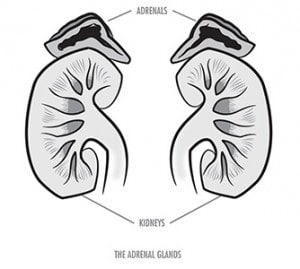What is Adrenal Fatigue?
- Safety and the use of L-Theanine in Children - October 19, 2025
- 4 ways your child may not tolerate cow’s dairy: allergy, milk protein sensitivity, cerebral folate deficiency, and lactose intolerance - January 3, 2024
- 5-hydroxytryptophan (5-HTP) and the “feel good” neurotransmitter serotonin - October 4, 2023
Adrenal Fatigue is a term often used by naturopathic physicians, but frequently misunderstood by patients and conventional medical doctors.
What are the adrenal glands?
The adrenal glands are small endocrine (hormone-producing) organs that sit on top of the kidneys. Each adrenal gland has two parts – the cortex (outside) and the medulla (inside). The medulla makes up only 10% of each adrenal gland and secretes epinephrine and norepinephrine, or “catecholamines.” Catecholamines are the “fight or flight” hormones that are secreted in response to acute stress. These hormones are responsible for the racing heart and sweaty palms you may have experienced after a fright.
The cortex makes up 90% of each gland and produces a number of hormones in different zones of the adrenal. Glucocorticoids are made by the outer layer and act to maintain blood sugar and regulate immunity. The hormone cortisol is the most active in this group. Cortisol is strongly anti-inflammatory and immune-supressing, which is why it is often used as a drug to treat many autoimmune conditions. Mineralocorticoids, including the hormone aldosterone, are produced in the middle layer and are used by the body to regulate fluid and electrolyte balance. Lastly, the inner layer makes adrenal androgens, particularly testosterone and DHEA, which regulate sexual organ function in partnership with the reproductive organs (the ovaries and testes), which also produce sex hormones.

It is also important to note that though all these hormones are produced in the adrenal gland, they are regulated in the brain (the brain tells the adrenal glands what/how much hormone to produce). This means that an imbalance in the adrenal hormones can be caused either by the adrenal gland or by the brain.
The Stress Response
The adrenal gland is intimately involved in the body’s response to stress. The best model we have to demonstrate the stress response is from an old study by Hans Selye in the 1950’s. Dr. Selye measured acute (short-term) and chronic (long-term) stress markers in animals (white rats) after placing them in stressful situations. He found that the stress response typically consisted of three phases, which he named the General Adaptation Syndrome:
1. The first phase of the stress response Dr. Selye termed The Alarm Reaction. Selye’s team stressed the rats by either tying their legs to the side of the cage, or forcing the rats to swim in water (not so humane, I agree). During the Alarm Reaction the rats struggled and had a significant increase in cortisol and epinephrine. Both of these hormones act to increase sugar in the blood (to provide fuel for the muscles and heart), and epinephrine vasoconstricts to shift blood toward the vital organs (the heart to pump faster, and the lungs to get more oxygen into the body). The animals reacted in a way that is beneficial to an acutely stressed body – these hormones were secreted to increase strength and stamina, all of which can help the animal escape from the situation.
2. The second phase of stress occurred when the rats continued to be subjected to stress and the rats recognized they would be unable to escape. Dr. Selye termed this the Stage of Resistance. In this stage the animals adapted behaviors in order to decrease acute stress: the swimming rats developed a more efficient swimming stroke, and the rats tied to the cage stopped struggling against their restraints. In this stage the epinephrine levels declined to normal, but the cortisol levels remained high to adapt to the stress. Many of these animals looked healthy until they suddenly dropped dead.
3. The final stage Dr. Selye called the Stage of Exhaustion. With long-term, continued stress, the animals were unable to maintain their adaptation. Many of the rats developed chronic diseases, or declined in health until they died. In the final stage of exhaustion cortisol levels decrease. In humans a drop of cortisol can lead to chronic fatigue, autoimmune conditions, or inflammatory conditions (remember that inflammation can cause or exacerbate many common conditions, like heart disease, alzheimer’s, asthma, and more).
Naturopathic physicians call the final two stages “Adrenal Fatigue.” During either of these stages the body is headed toward a state of chronic disease. Unfortunately, cortisol dysregulation (“Adrenal Fatigue”) is a ubiquitous problem in modern society for a number of reasons – from the use of artificial lights, to sedentary lifestyles, to the presence of a multitude of stressors that our bodies were never designed to handle. Though humans handle stress similarly to other animals, in some ways we are more disadvantaged by our ability to think, plan, and worry, all of which are a constant source of stress.
Diagnosis and Treatment
Naturopathic physicians can diagnose the presence and extent of Adrenal Fatigue by taking a thorough history and doing laboratory testing. Naturopathic doctors often measure blood and salivary levels of cortisol, often at multiple times during the day to determine the severity of cortisol dysregulation. Naturopathic treatment is personalized for each patient depending on their lab values and specific needs. ND’s have a variety of treatment options, including specific botanical medicines and supplements help re-establish a normal balance of cortisol. Often naturopathic physicians combine these with different lifestyle changes to optimize health. Many patients report increased energy, better sleep, better work performance and less anxiety after beginning a naturopathic adrenal support protocol.








Kaori
November 14, 2012 at 6:55 pmThis is a great article to post as part of hhtealy aging as many people associate stress with working-age individuals since a huge source of stress is associated with work, whereas retirees are often assumed to have less stress not that I don’t covet the time they have on their hands LOL. However anyone with friends and parents in their 60+ years know full well that significant stress remains present for many reasons, e.g. health problems, financial concerns, or feeling lost’ when there is no longer a workplace to go to. I think retirement is a stressful event for many people although most put on a brave face.
Pingback: Foundations – 10 Ways to Improve Your Health
February 13, 2013 at 11:00 pmPingback: Just Breathe! (Work Out Your Parasympathetics)
March 28, 2013 at 10:18 amPingback: Water, Water Everywhere… If We Could Only Remember to Drink!
April 10, 2013 at 6:01 pmRicky
May 1, 2013 at 2:29 pmI simply hoped to just take a few minutes and let
you know that I appreciated the blog post. I frankly don’t think that many people know the amount of effort that gets put into making a good blog website. I am aware that this is sort of random but it really bothers me sometimes. At any rate fantastic blog site.
Jimmy Med
November 21, 2015 at 4:14 amErika, adrenal fatigue is not a real disease. Naturopaths invented this disease and seem to be the only ones who can diagnose it. Given that you seem like one of the smarter naturopaths out there, especially because you actually acknowledge that vaccines convey great benefit and pose negligible harm, you should be able to wade through the literature and arrive at the conclusion that adrenal fatigue is a business ploy. Here’s a couple references.
1) http://www.hormone.org/hormones-and-health/myth-vs-fact/adrenal-fatigue
2) http://www.ingentaconnect.com/content/ocean/aap/2012/00000033/A00103s1/art00031
3) https://www.sciencebasedmedicine.org/fatigued-by-a-fake-disease/
Dr. Erika Krumbeck
November 21, 2015 at 8:11 pmHi Jimmy,
Actually, integrative medicine practitioners and other CAM practitioners diagnose this condition too. I think the easiest way to explain this is to say that some individuals have a maladaptive response to stress. The documented effects of excessive cortisol (in absence of Cushing’s syndrome) are real and are linked to the negative effects of metabolic disease.
We could debate this eternally, but in the end it comes down to clinical experience. The majority of my chronically fatigued patients improve when we give them “adrenal support” supplements. (Placebo effect? Possibly. But then it would be a very strong placebo that I’m still willing to give my patients.)
Jimmy Med
November 23, 2015 at 3:24 amNo legitimate medical authority or society anywhere in the world recognizes “adrenal fatigue” as real. There are conditions like adrenal insufficiency and Addison’s disease, which have very clear clinical presentations that a third-year medical student would be able to diagnose. You said it yourself, integrative and CAM practitioners treat “adrenal fatigue.” This is because they want to make money selling their services and expensive supplements. How can they know better than the endocrinologists? I have never heard of adrenal fatigue until I became interested in what CAM practitioners were doing in my state. (Disclaimer: I am board certified in internal medicine and nephrology.) So you are basically practicing placebo medicine?
Dr. Erika Krumbeck
November 23, 2015 at 11:15 amI treat adrenal fatigue because I see significant clinical results when I do.
Jimmy Med
December 1, 2015 at 2:51 amHi Erika, I see you did not approve my last comment. Well that’s okay, but it’s not helping your patients who are being diagnosed with fake diseases and being managed by someone (you) who didn’t get actual medical training. You are not being fair to them or yourself.